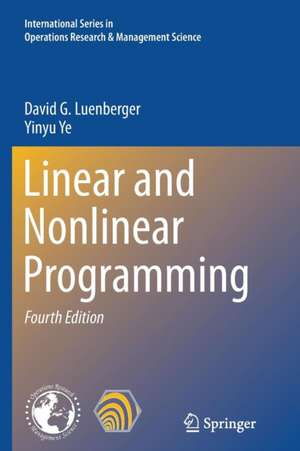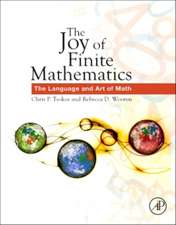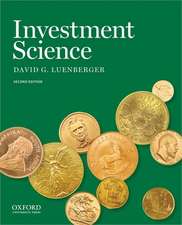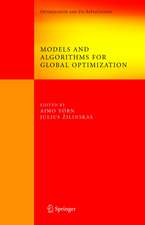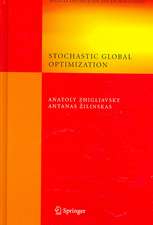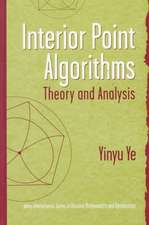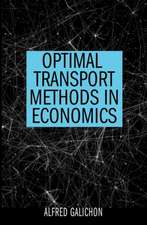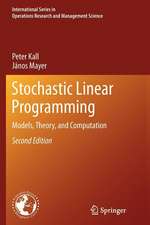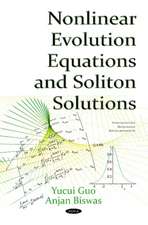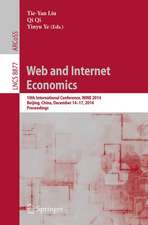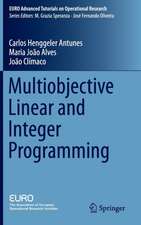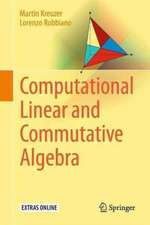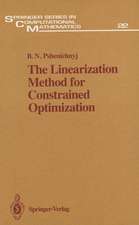Linear and Nonlinear Programming: International Series in Operations Research & Management Science, cartea 228
Autor David G. Luenberger, Yinyu Yeen Limba Engleză Paperback – 17 oct 2016
New to this edition is a chapter devoted to Conic Linear Programming, a powerful generalization of Linear Programming. Indeed, many conic structures are possible and useful in a variety of applications. It must be recognized, however, that conic linear programming is an advanced topic, requiring special study. Another important topic is an accelerated steepest descent method that exhibits superior convergence properties, and for this reason, has become quite popular. The proof of the convergence property for both standard and accelerated steepest descent methods are presented in Chapter 8. As in previous editions, end-of-chapter exercises appear for all chapters.
From the reviews of the Third Edition:
“… this very well-written book is a classic textbook in Optimization. It should be present in the bookcase of each student, researcher, and specialist from the host of disciplines from which practical optimization applications are drawn.” (Jean-Jacques Strodiot, Zentralblatt MATH, Vol. 1207, 2011)
| Toate formatele și edițiile | Preț | Express |
|---|---|---|
| Paperback (3) | 541.07 lei 6-8 săpt. | +34.62 lei 7-13 zile |
| Springer International Publishing – 2 noi 2022 | 570.62 lei 3-5 săpt. | +34.62 lei 7-13 zile |
| Springer Us – 19 noi 2010 | 541.07 lei 6-8 săpt. | |
| Springer International Publishing – 17 oct 2016 | 596.87 lei 6-8 săpt. | |
| Hardback (3) | 716.15 lei 6-8 săpt. | |
| Springer Us – 7 iul 2008 | 716.15 lei 6-8 săpt. | |
| Springer International Publishing – noi 2021 | 912.01 lei 6-8 săpt. | |
| Springer – 8 iul 2015 | 1082.39 lei 39-44 zile |
Din seria International Series in Operations Research & Management Science
- 20%
 Preț: 331.25 lei
Preț: 331.25 lei - 9%
 Preț: 696.06 lei
Preț: 696.06 lei - 20%
 Preț: 570.62 lei
Preț: 570.62 lei - 18%
 Preț: 1132.02 lei
Preț: 1132.02 lei - 18%
 Preț: 773.72 lei
Preț: 773.72 lei -
 Preț: 170.40 lei
Preț: 170.40 lei - 17%
 Preț: 459.35 lei
Preț: 459.35 lei - 17%
 Preț: 360.48 lei
Preț: 360.48 lei -
 Preț: 263.40 lei
Preț: 263.40 lei - 24%
 Preț: 905.31 lei
Preț: 905.31 lei - 17%
 Preț: 460.09 lei
Preț: 460.09 lei - 17%
 Preț: 459.35 lei
Preț: 459.35 lei - 20%
 Preț: 631.58 lei
Preț: 631.58 lei - 13%
 Preț: 480.01 lei
Preț: 480.01 lei - 18%
 Preț: 738.28 lei
Preț: 738.28 lei - 18%
 Preț: 1225.94 lei
Preț: 1225.94 lei - 18%
 Preț: 948.92 lei
Preț: 948.92 lei - 18%
 Preț: 703.88 lei
Preț: 703.88 lei - 18%
 Preț: 957.44 lei
Preț: 957.44 lei - 15%
 Preț: 651.84 lei
Preț: 651.84 lei - 20%
 Preț: 336.21 lei
Preț: 336.21 lei - 15%
 Preț: 641.03 lei
Preț: 641.03 lei -
 Preț: 404.29 lei
Preț: 404.29 lei - 18%
 Preț: 950.21 lei
Preț: 950.21 lei - 15%
 Preț: 649.06 lei
Preț: 649.06 lei - 18%
 Preț: 725.75 lei
Preț: 725.75 lei -
 Preț: 394.12 lei
Preț: 394.12 lei - 18%
 Preț: 951.47 lei
Preț: 951.47 lei - 15%
 Preț: 639.59 lei
Preț: 639.59 lei - 18%
 Preț: 773.06 lei
Preț: 773.06 lei - 18%
 Preț: 889.29 lei
Preț: 889.29 lei - 15%
 Preț: 655.60 lei
Preț: 655.60 lei - 15%
 Preț: 640.06 lei
Preț: 640.06 lei
Preț: 596.87 lei
Preț vechi: 702.21 lei
-15% Nou
Puncte Express: 895
Preț estimativ în valută:
114.21€ • 122.13$ • 95.23£
114.21€ • 122.13$ • 95.23£
Carte tipărită la comandă
Livrare economică 17 aprilie-01 mai
Preluare comenzi: 021 569.72.76
Specificații
ISBN-13: 9783319374390
ISBN-10: 3319374397
Pagini: 559
Ilustrații: XIII, 546 p. 90 illus.
Dimensiuni: 155 x 235 x 29 mm
Greutate: 0.78 kg
Ediția:Softcover reprint of the original 4th ed. 2016
Editura: Springer International Publishing
Colecția Springer
Seria International Series in Operations Research & Management Science
Locul publicării:Cham, Switzerland
ISBN-10: 3319374397
Pagini: 559
Ilustrații: XIII, 546 p. 90 illus.
Dimensiuni: 155 x 235 x 29 mm
Greutate: 0.78 kg
Ediția:Softcover reprint of the original 4th ed. 2016
Editura: Springer International Publishing
Colecția Springer
Seria International Series in Operations Research & Management Science
Locul publicării:Cham, Switzerland
Cuprins
Introduction.- Part I Linear Programming.- Basic Properties of Linear Programs.- The Simplex Method.- Duality and Complementarity.- Interior-Point Methods.- Conic Linear Programming.- Part II Unconstrained Problems.- Basic Properties of Solutions and Algorithms.- Basic Descent Methods.- Conjugate Direction Methods.- Quasi-Newton Methods.- Part III Constrained Minimization.- Constrained Minimization Conditions.- Primal Methods.- Penalty and Barrier Methods.- Duality and Dual Methods.- Primal-Dual Methods.- Appendix A: Mathematical Review.- Appendix B: Convex Sets.- Appendix C: Gaussian Elimination.- Appendix D: Basic Network Concepts.
Recenzii
Notă biografică
David G. Luenberger received the B.S. degree from the California Institute of Technology and the M.S. and Ph.D. degrees from Stanford University, all in Electrical Engineering. Since 1963 he has been on the faculty of Stanford University. He helped found the Department of Engineering-Economic Systems, now merged to become the Department of Management Science and Engineering, where his is currently a professor.
He served as Technical Assistant to the President’s Science Advisor in 1971-72, was Guest Professor at the Technical University of Denmark (1986), Visiting Professor of the Massachusetts Institute of Technology (1976), and served as Department Chairman at Stanford (1980-1991).
His awards include: Member of the National Academy of Engineering (2008), the Bode Lecture Prize of the Control Systems Society (1990), the Oldenburger Medal of the American Society of Mechanical Engineers (1995), and the Expository Writing Award of the Institute of Operations Research and Management Science (1999). He is a Fellow of the Institute of Electrical and Electronic Engineers (since 1975).
Yinyu Ye is currently the Kwoh-Ting Li Professor in the School of Engineering at the Department of Management Science and Engineering and Institute of Computational and Mathematical Engineering and the Director of the MS&E Industrial Affiliates Program, Stanford University. He received the B.S. degree in System Engineering from the Huazhong University of Science and Technology, China, and the M.S. and Ph.D. degrees in Engineering-Economic Systems and Operations Research from Stanford University.
Ye's research interests lie in the areas of optimization, complexity theory, algorithm design and analysis, and applications of mathematical programming, operations research and system engineering. He is also interested in developing optimization software for various real-world applications. Current research topics include Liner Programming Algorithms, Markov Decision Processes, Computational Game/Market Equilibrium, Metric Distance Geometry, Dynamic Resource Allocation, and Stochastic and Robust Decision Making, etc. He is an INFORMS (The Institute for Operations Research and The Management Science) Fellow, and has received several research awards including the inaugural 2012 ISMP Tseng Lectureship Prize for outstanding contribution to continuous optimization, the 2009 John von Neumann Theory Prize for fundamental sustained contributions to theory in Operations Research and the Management Sciences, the inaugural 2006 Farkas prize on Optimization, and the 2009 IBM Faculty Award.
He served as Technical Assistant to the President’s Science Advisor in 1971-72, was Guest Professor at the Technical University of Denmark (1986), Visiting Professor of the Massachusetts Institute of Technology (1976), and served as Department Chairman at Stanford (1980-1991).
His awards include: Member of the National Academy of Engineering (2008), the Bode Lecture Prize of the Control Systems Society (1990), the Oldenburger Medal of the American Society of Mechanical Engineers (1995), and the Expository Writing Award of the Institute of Operations Research and Management Science (1999). He is a Fellow of the Institute of Electrical and Electronic Engineers (since 1975).
Yinyu Ye is currently the Kwoh-Ting Li Professor in the School of Engineering at the Department of Management Science and Engineering and Institute of Computational and Mathematical Engineering and the Director of the MS&E Industrial Affiliates Program, Stanford University. He received the B.S. degree in System Engineering from the Huazhong University of Science and Technology, China, and the M.S. and Ph.D. degrees in Engineering-Economic Systems and Operations Research from Stanford University.
Ye's research interests lie in the areas of optimization, complexity theory, algorithm design and analysis, and applications of mathematical programming, operations research and system engineering. He is also interested in developing optimization software for various real-world applications. Current research topics include Liner Programming Algorithms, Markov Decision Processes, Computational Game/Market Equilibrium, Metric Distance Geometry, Dynamic Resource Allocation, and Stochastic and Robust Decision Making, etc. He is an INFORMS (The Institute for Operations Research and The Management Science) Fellow, and has received several research awards including the inaugural 2012 ISMP Tseng Lectureship Prize for outstanding contribution to continuous optimization, the 2009 John von Neumann Theory Prize for fundamental sustained contributions to theory in Operations Research and the Management Sciences, the inaugural 2006 Farkas prize on Optimization, and the 2009 IBM Faculty Award.
Textul de pe ultima copertă
This new edition covers the central concepts of practical optimization techniques, with an emphasis on methods that are both state-of-the-art and popular. Again a connection between the purely analytical character of an optimization problem and the behavior of algorithms used to solve the problem. As in the earlier editions, the material in this fourth edition is organized into three separate parts. Part I is a self-contained introduction to linear programming covering numerical algorithms and many of its important special applications. Part II, which is independent of Part I, covers the theory of unconstrained optimization, including both derivations of the appropriate optimality conditions and an introduction to basic algorithms. Part III extends the concepts developed in the second part to constrained optimization problems. It is possible to go directly into Parts II and III omitting Part I, and, in fact, the book has been used in this way in many universities.
From the reviews of the Third Edition
“….this very well-written book is a classic textbook in Optimization. It should be present in the bookcase of each student, researcher, and specialist from the host of disciplines from which practical optimization applications are drawn.” (Jean-Jacques Strodiot, Zentralblatt MATH, Vol.1207, 2011).
From the reviews of the Third Edition
“….this very well-written book is a classic textbook in Optimization. It should be present in the bookcase of each student, researcher, and specialist from the host of disciplines from which practical optimization applications are drawn.” (Jean-Jacques Strodiot, Zentralblatt MATH, Vol.1207, 2011).
Caracteristici
Complete updating of bestselling text in the field Entirely new chapter on Semidefinite Programming Includes end-of-chapter exercises
